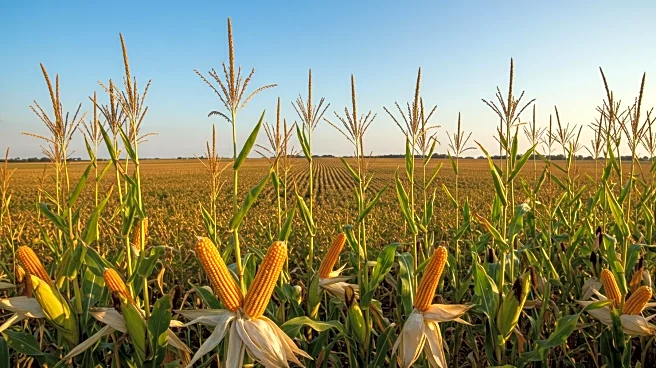What is the story about?
What's Happening?
Recent innovations are expanding the use of corn and soybeans beyond traditional markets, aiming to boost demand and provide sustainable solutions. Corn and soybeans, primarily used in animal feed and ethanol production, are now being utilized in unexpected areas such as textiles, tires, plastics, and even medical applications. For instance, NeuEsse, a biotech company, has developed a soy-based skin substitute for burn victims, which is in the final stages of FDA approval. Additionally, soy-based firefighting foam offers a biodegradable alternative to traditional foams, and Goodyear has incorporated soybean oil into tires to replace petroleum. These developments are part of a broader effort by the United Soybean Board and other agricultural organizations to diversify the uses of these crops.
Why It's Important?
The diversification of corn and soybean uses is crucial as traditional demand sources flatten. By finding new applications, the agricultural industry can maintain profitability and meet evolving consumer demands for sustainable products. Innovations like soy-based medical treatments and biodegradable firefighting foams not only open new markets but also address environmental and health concerns. This shift is significant for farmers who rely on these crops for their livelihoods, as it helps stabilize prices and ensures continued demand. Moreover, these developments align with global trends towards sustainability and reduced reliance on fossil fuels, positioning U.S. agriculture as a leader in eco-friendly innovations.
What's Next?
As these innovations progress, further certifications and approvals are anticipated, particularly for products like the soy-based firefighting foam and medical applications. The agricultural sector is likely to continue investing in research and development to discover additional uses for corn and soybeans. This could lead to partnerships with industries seeking sustainable alternatives, potentially increasing the market share for these crops. The success of these initiatives may also influence policy decisions related to agricultural subsidies and environmental regulations, encouraging more sustainable practices across the industry.
Beyond the Headlines
The shift towards using agricultural products in diverse industries highlights a broader trend of integrating sustainability into manufacturing and consumer goods. This movement could lead to significant reductions in carbon footprints and reliance on non-renewable resources. Additionally, the development of plant-based alternatives may drive cultural shifts in consumer preferences, prioritizing eco-friendly products. These changes could have long-term implications for global trade dynamics, as countries adjust to new agricultural and industrial landscapes.















